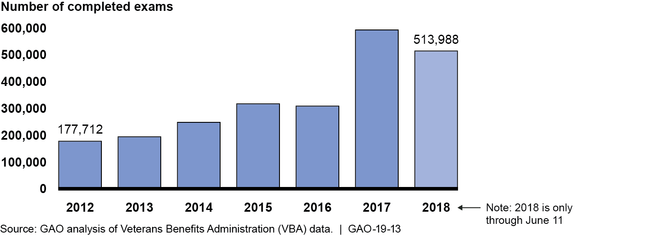WASHINGTON—A review of outsourcing by the Veterans Benefits Administration raised issues about the quality of contractor examinations and also questioned whether a proposed solution will work as intended.
A new VBA compensation exam management system provides opportunities to improve oversight of its contractors, but, without a detailed roadmap, the benefits might be “limited,” a new Government Accountability Office report suggested.
Specifically, VBA needs a plan on how it will use the data “to monitor insufficient exams, ensure it pays contractors the correct amount for those exams, and help it accurately calculate contractor timeliness,” the GAO recommended.
“The new system provides an opportunity for VBA to conduct analyses that could identify high-level trends and challenges facing the program across contractors and districts, such as delays in completing exams in specific parts of the country or contractor performance issues related to specific exam types,” according to the oversight report.
The conclusions were part of a GAO review on VA’s disability exams; the report noted that “VBA’s lack of accurate and up-to-date data and reports on contractor performance hampers its ability to oversee the quality and timeliness of exams provided through contractors.”
Overall in fiscal year 2017, GAO reported that VA paid about $72.4 billion to about 4.5 million veterans in disability compensation. At the same time, VBA’s 57 regional offices processed more than 1.2 million veterans’ disability compensation claims to determine eligibility for benefits.
According to VBA officials, when a VHA facility does not have the capacity to conduct a timely disability medical exam, an exam request is sent to a contractor. Use of outsourcing is increasing, according to the VBA, with the number of contractor exams increasing from about 178,000 in FY 2012 to almost 600,000 in FY 2017.
“VA estimates that in fiscal year 2019, contractors will complete over 1.8 million exam reports for almost 800,000 veterans,” the report explained.
The GAO report raised questions about whether contractor exams are good enough, since VBA reported that almost all contractors missed quality targets of 92% in the first half of calendar year 2017.
“More specifically, VBA-determined quarterly quality scores—the percentage of disability compensation exam reports with no errors as measured against VBA criteria—for the seven contracts used by VBA in calendar year 2017 showed that contractors were frequently well below the quality target,” the report stated.
GAO reviewers added, “VBA has not yet completed all of the quality reviews used to calculate contractor quality scores, particularly for exams that were completed in the second half of 2017,” but “is hiring and training additional quality review staff to complete these reviews and help manage the workload moving forward.”
Quality analysis does not include timelessness, however. GAO was told that VBA has not calculated that metric as outlined in the contracts.
“VBA officials said they were unable to track the timeliness of exam reports sent back to contractors for corrections, which is needed to determine if VBA should reduce payment to a contractor,” the report explained.

GAO’s own analysis showed that about half of the exams were completed in about 20 days, although exams that had not been completed were not included. As of late June 2018, VBA-calculated data showed that 87,768 requested exams had not yet been completed, including 37,077 exams that had already exceeded VBA’s timeliness targets.
“Tracking these exams is important because a large volume of such exams could ultimately increase the amount of time veterans have to wait for their claims to be processed. VBA officials stated that the agency closely monitors contractors’ workloads and helps expedite requested exams that have exceeded VBA’s targets for completing exams,” GAO noted.
Recommendations
The report explained that with expected improvements provided by a new exam management system and increased staff to manage the program, “VBA should be better positioned to conduct analyses of performance data in the future.”
Still, despite those capabilities GAO stated that “VBA has not outlined plans for using improved information in this manner,” adding, “Without doing so, the agency may miss opportunities to improve the program and, ultimately, its service to veterans.”
GAO also suggested that VBA should ensure that contracted examiners have completed required training and should collect information to assess and improve that training.
“While VBA plans to improve monitoring of training, it has not documented plans for tracking or collecting information to assess training. These actions could help ensure that VBA contractors provide veterans with high-quality exams and help VBA determine if additional training is needed,” the report explained.
The VA agreed with GAO recommendations to develop a plan for using its new data system to monitor contractors’ quality and timeliness performance; analyze overall program performance; verify that contracted examiners complete required training; and collect information to assess the effectiveness of that training.
